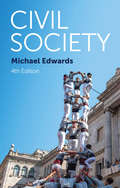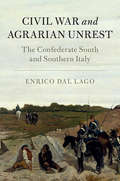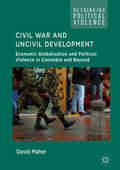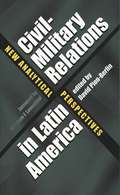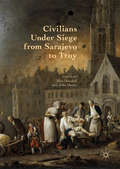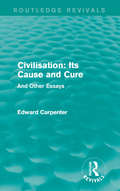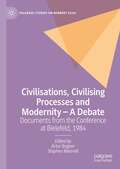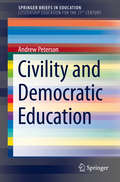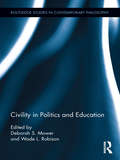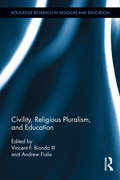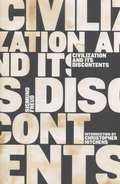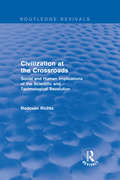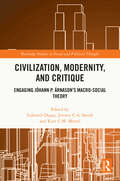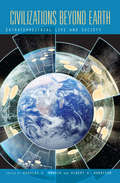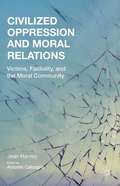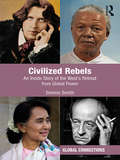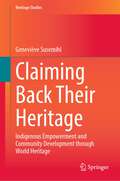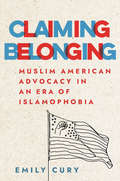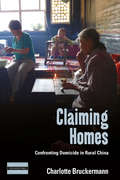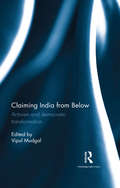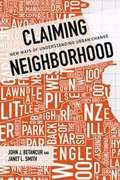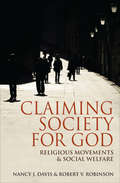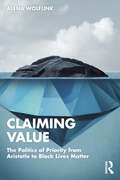- Table View
- List View
Civil Society: Civil Society And The Social Capital Debate In Comparative Perspective (Oxford Handbooks Ser.)
by Michael EdwardsNow in its fourth edition, Civil Society has become a major work of reference for those who seek to understand the role of voluntary citizen action in a troubled world. Recent economic and political developments do not bode well for the theory and practice of civil society: communities are increasingly divided; inequality is on the rise; authoritarians and populists have gained a foothold even in advanced democracies; restrictions on freedom of speech and association are increasingly common and recent scandals have even reduced trust in charities. Worryingly, public spheres seem incapable of addressing these concerns. Yet, as Michael Edwards makes clear, ideas about the civil sphere can shed much light on what is happening, why, and how we might respond to polarization, privatization, and authoritarians of various stripes. Fully updated to take account of recent work on digital culture, democracy, and philanthropy, Civil Society will be required reading for anyone who is interested in creating a better world through voluntary citizen action.
Civil War and Agrarian Unrest: The Confederate South and Southern Italy (Cambridge Studies on the American South)
by Dal Lago EnricoBetween 1861 and 1865, both the Confederate South and Southern Italy underwent dramatic processes of nation-building, with the creation of the Confederate States of America and the Kingdom of Italy, in the midst of civil wars. This is the first book that compares these parallel developments by focusing on the Unionist and pro-Bourbon political forces that opposed the two new nations in inner civil conflicts. Overlapping these conflicts were the social revolutions triggered by the rebellions of American slaves and Southern Italian peasants against the slaveholding and landowning elites. Utilizing a comparative perspective, Enrico Dal Lago sheds light on the reasons why these combined factors of internal opposition proved fatal for the Confederacy in the American Civil War, while the Italian Kingdom survived its own civil war. At the heart of this comparison is a desire to understand how and why nineteenth-century nations rose and either endured or disappeared. The first systematic comparison of aspects of the American Civil War with a contemporaneous civil war in another country: Italy. Utilizes the comparison between the Confederate States of America and the Kingdom of Italy to shed light on the reasons for the rise (and survival or fall) of nineteenth-century nations. Provides a valuable contribution comparative history and the study of nineteenth-century nationalism and nation-building.
Civil War and Uncivil Development: Economic Globalisation And Political Violence In Colombia And Beyond (Rethinking Political Violence Ser.)
by David MaherThis book challenges the conventional wisdom that civil war inevitably stymies economic development and that ‘civil war represents development in reverse’. While some civil wars may have adverse economic effects, Civil War and Uncivil Development posits that not all conflicts have negative economic consequences and, under certain conditions, civil war violence can bolster processes of economic development. Using Colombia as a case study, this book provides evidence that violence perpetrated by key actors of the conflict – the public armed forces and paramilitaries – has facilitated economic growth and processes of economic globalisation in Colombia (namely, international trade and foreign direct investment), with profoundly negative consequences for large swathes of civilians. The analysis also discusses the ‘development in reverse’ logic in the context of other conflicts across the globe. This book will be an invaluable resource for scholars, practitioners and students in the fields of security and development, civil war studies, peace studies, the political economy of conflict and international relations.
Civil-Military Relations in Latin America
by David Pion-BerlinThe armed forces may no longer rule nations throughout Latin America, but they continue to influence democratic governments across the region. In nine original, thought-provoking essays, this book offers fresh theoretical insights into the dilemmas facing Latin American politicians as they struggle to gain full control over their military institutions. Latin America has changed in profound ways since the end of the Cold War, the re-emergence of democracy, and the ascendancy of free-market economies and trade blocs. The contributors to this volume recognize the necessity of finding intellectual approaches that speak to these transformations. They utilize a wide range of contemporary models to analyze recent political and economic reform in nations throughout Latin America, presenting case studies on Argentina, Brazil, Chile, Ecuador, El Salvador, Honduras, and Venezuela. Bridging the gap between Latin American studies and political science, these essays not only explore the forces that shape civil-military relations in Latin America but also address larger questions of political development and democratization in the region.The contributors are Felipe Aguero, J. Samuel Fitch, Wendy Hunter, Ernesto Lopez, Brian Loveman, David R. Mares, Deborah L. Norden, David Pion-Berlin, and Harold A. Trinkunas.Latin American Studies/Political ScienceContributorsFelipe Aguero, University of MiamiJ. Samuel Fitch, University of Colorado at BoulderWendy Hunter, University of Texas at Austin Ernesto Lopez, Universidad Nacional de Quilmes (Buenos Aires, Argentina)Brian Loveman, San Diego State UniversityDavid R. Mares, University of California at San DiegoDeborah L. Norden, Whittier College (Whittier, Cal.)David Pion-Berlin, University of California, Riverside Harold A. Trinkunas, Naval Postgraduate School (Monterey, Cal.)-->
Civilians Under Siege from Sarajevo to Troy
by John Horne Alex DowdallThis edited volume analyses siege warfare as a discrete type of military engagement, in the face of which civilians are particularly vulnerable. Siege warfare is a form of combat that has usually had devastating effects on civilian populations. From the near-contemporary Siege of Sarajevo to the real and mythical sieges of the ancient Mediterranean, this has been a recurring type of military engagement which, through bombardment, starvation, disease and massacre, places non-combatants at the heart of battle. To date, however, there has been little recognition of the effects of siege warfare on civilians. This edited volume addresses this gap. Using a distinctive regressive method, it begins with the present and works backwards, avoiding teleological interpretations that suggest the targeting of civilians in war is a modern phenomenon. Its contributors interrogate civilians' roles during sieges, both as victims and active participants; the laws and customs of siege warfare; its place in historical memory, and the ways civilian survivors have dealt with trauma. Its scope and content ensure that the collection is essential reading for all those interested in the place of civilians in war. Chapter 2 of this book is available open access under a CC BY 4. 0 license at link. springer. com
Civilisation: And Other Essays (Routledge Revivals: The Collected Works of Edward Carpenter)
by Edward CarpenterThis volume, originally published in 1889 with this edition published in 1912, contains Carpenter's famous essays on civilisation and his theory that it is a disease of mankind that must be cured. Papers included in this collection discuss the rampant ill-health suffered by society as well as criticisms of modern science to support this theory whilst also analysing what the future holds for science, ideas of morality and traditions and customs. This title will be of interest to students of sociology.
Civilisations, Civilising Processes and Modernity – A Debate: Documents from the Conference at Bielefeld, 1984 (Palgrave Studies on Norbert Elias)
by Stephen Mennell Artur BognerIn 1984, the celebrated sociologist and historian Norbert Elias convened a major conference on ‘Civilisations and civilising processes’ at the Centre for Interdisciplinary Research (University of Bielefeld). Participants included the most distinguished and influential scholars in historical sociology and world history. This book will make available, for the first time in one place, the papers presented by the speakers and, even more interestingly, the transcripts of discussions at the symposium. This conference brought together eminent and internationally reputed scholars of macro-history and historical sociology including Johann P. Arnason, Elias, Hans-Dieter Evers, Johan Goudsblom, Keith Hopkins, William H. McNeill, and Immanuel Wallerstein. This highly informative encounter between various leading scholars of humanity’s global social history has never before been published, although it was completely recorded on paper and in tape recordings. Its publication in one volume should be an important event for all students of the long-term structural transformations of humanity.
Civility
by Benet DavetianCut off in traffic? Bumped without apology on the subway? Forced to listen to a profane conversation in a public space? In today's Western societies, many feel that there has been a noticeable and marked decrease in mutual consideration in both public and private settings. Are we less civil now than in the past? Benet Davetian's masterful study Civility: A Cultural History responds to this question through a historical, social, and psychological discussion of the civility practices in three nations - England, France, and the United States. Davetian's rich, multi-dimensional review of civility from 1200 to the present day provides an in-depth analysis of the social and personal psychology of human interaction and charts a new course for the study and understanding of civility and civil society. Civility addresses major topics in public discourse today regarding the ideals and practices of civility and the possibility of a future civility ethic capable of inspiring cooperation across cultural and national boundaries.
Civility and Democratic Education (SpringerBriefs in Education)
by Andrew PetersonThis book explores how and why civility contributes to a vibrant democratic society, and how it can be fostered and cultivated as a key part of democratic education. It suggests that civility only makes sense as a civic virtue if it is conceived in relation to civic friendship, concord and fellow-feeling. This book offers a timely snapshot of civility as a pressing, yet enduring, concern in democratic life and education. It elucidates a virtue-based conceptualization of civility and its place within democratic education, and makes use of real-life examples and cases to illustrate its arguments and to engage a range of readers. In short, this book is interested in what civility is and how schools can and do cultivate civility.
Civility in Politics and Education (Routledge Studies in Contemporary Philosophy)
by Wade L. Robison Deborah S. MowerThis book examines the concept of civility and the conditions of civil disagreement in politics and education. Although many assume that civility is merely polite behavior, it functions to aid rational discourse. Building on this basic assumption, the book offers multiple accounts of civility and its contribution to citizenship, deliberative democracy, and education from Eastern and Western as well as classic and modern perspectives. Given that civility is essential to all aspects of public life, it is important to address how civility may be taught. While much of the book is theoretical, contributors also apply theory to practice, offering concrete methods for teaching civility at the high school and collegiate levels.
Civility, Religious Pluralism and Education (Routledge Research in Religion and Education)
by Andrew Fiala Vincent F. Biondo IIIThis book focuses on the problem of religious diversity, civil dialogue, and religion education in public schools, exploring the ways in which atheists, secularists, fundamentalists, and mainstream religionists come together in the public sphere, examining how civil discourse about religion fit swithin the ideals of the American political and pedagogical systems and how religious studies education can help to foster civility and toleration.
Civilization and its Discontents
by Sigmund Freud James Strachey Christopher Hitchens Peter GayWritten in the decade before Freud's death, Civilization and Its Discontents may be his most famous and most brilliant work. It has been praised, dissected, lambasted, interpreted, and reinterpreted. Originally published in 1930, it seeks to answer several questions fundamental to human society and its organization: What influences led to the creation of civilization? Why and how did it come to be? What determines civilization's trajectory? Freud's theories on the effect of the knowledge of death on human existence and the birth of art are central to his work. Of the various English translations of Freud's major works to appear in his lifetime, only Norton's Standard Edition, under the general editorship of James Strachey, was authorized by Freud himself. This new edition includes both an introduction by the renowned cultural critic and writer Christopher Hitchens as well as Peter Gay's classic biographical note on Freud.
Civilization and its Discontents
by Sigmund Freud James StracheyFreud gives his views on the conflict between the individual's claim to freedom and society's demands.
Civilization at the Crossroads (International Arts and Sciences Press): Social and Human Implications of the Scientific and Technological Revolution
by Radovan RichtaThis title was first published in 1968
Civilization, Modernity, and Critique: Engaging Jóhann P. Árnason’s Macro-Social Theory (Routledge Studies in Social and Political Thought)
by Jeremy C.A. Smith L̓ubomír Dunaj Kurt C.M. MertelCivilization, Modernity, and Critique provides the first comprehensive, cutting-edge engagement with the work of one of the most foundational figures in civilizational analysis: Jóhann P. Árnason. In order to do justice to Árnason’s seminal and wide-ranging contributions to sociology, social theory and history, it brings together distinguished scholars from a variety of disciplinary backgrounds and geographical contexts. Through a critical, interdisciplinary dialogue, it offers an enrichment and expansion of the methodological, theoretical, and applicative scope of civilizational analysis, by addressing some of the most complex and pressing problems of contemporary global society. A unique and timely contribution to the ongoing task of advancing the project of a critical theory of society, this volume will appeal to scholars of sociology and social theory with interests in historical sociology, critical theory and civilizational analysis.
Civilizations Beyond Earth
by Douglas A. Vakoch Albert A.Astronomers around the world are pointing their telescopes toward the heavens, searching for signs of intelligent life. If they make contact with an advanced alien civilization, how will humankind respond? In thinking about first contact, the contributors to this volume present new empirical and theoretical research on the societal dimensions of the Search for Extraterrestrial Intelligence (SETI). Archaeologists and astronomers explore the likelihood that extraterrestrial intelligence exists, using scientific insights to estimate such elusive factors as the longevity of technological societies. Sociologists present the latest findings of novel surveys, tapping into the public's attitudes about life beyond Earth to show how religion and education influence beliefs about extraterrestrials. Scholars from such diverse disciplines as mathematics, chemistry, journalism, and religious studies offer innovative solutions for bridging the cultural gap between human and extraterrestrial civilizations, while recognizing the tremendous challenges of communicating at interstellar distances. At a time when new planets are being discovered around other stars at an unprecedented rate, this collection provides a much needed guide to the human impact of discovering we are not alone in the universe.
Civilized Oppression and Moral Relations
by Jean HarveyThere are significant differences between civilized oppression and violent oppression and these differences show not only in the phenomena involved, but also in the nature of those who actively contribute to the two phenomena ('contributing agents'). Fair characterizations of the agents of civilized oppression often require very different descriptions from those applying to violent oppressors. Many of the failings behind civilized oppression are shared by both the contributing agents and alarge number of the victims. Often it is the privileged social position of the agents that allows those failings to have such a serious impact, whereas the same failings in the victims may be fairly innocuous (though they are not always). This book is alert to this and other differences between civilized and violent oppression. Jean Harvey examines what the moral relations should be between the key players in civilized oppression: the agents, victims, and 'bystanders'.
Civilized Rebels: An Inside Story of the West’s Retreat from Global Power (Global Connections)
by Dennis SmithCivilized Rebels compares in depth four very well-known literary and political figures, who all opposed arrogant regimes and became prisoners. Through comparative biographies of Oscar Wilde, Jean Améry, Nelson Mandela and Aung San Suu Kyi, it explores the long-term process of the retreat of the West from global power since the late nineteenth century, relating this to the decline and fall of the British Empire and the trauma surrounding Brexit. Drawing on rich empirical materials to examine themes of forced displacement, war, poverty, imprisonment and the threat of humiliation, the book reveals how these highly civilized rebels penetrated their opponents’ mind-sets, while also providing a sophisticated analysis of how their struggles fitted into the larger world picture. Methodologically and theoretically innovative, and written in a lively and accessible style, Civilized Rebels will appeal to scholars across a range of disciplines, with interests in globalization, historical international relations, postcolonial and subaltern studies, comparative biographical studies, European studies, the sociology of emotions and historical sociology.
Claiming Back Their Heritage: Indigenous Empowerment and Community Development through World Heritage (Heritage Studies)
by Geneviève SusemihlThis book provides a unique, in-depth look at three Indigenous World Heritage sites in Canada and their use for Indigenous empowerment and community development. Based on extensive ethnographic field studies and comprehensive narrative interviews, it shows how the three First Nation communities presented in the case studies enforce recognition of their collective rights to preserve their cultural heritage and assert their right to political, economic, cultural, and social self-determination. It also considers the prevailing universalistic discourses around World Heritage and the various ways in which they serve to either reinforce existing oppressive conditions regarding Indigenous communities and voices or provide opportunities to overcome them. The book will be of interest to scholars and students working on social and cultural histories, histories of colonialism, and in heritage and museum studies.
Claiming Belonging: Muslim American Advocacy in an Era of Islamophobia
by Emily CuryClaiming Belonging dives deep into the lives of Muslim American advocacy groups in the post-9/11 era, asking how they form and function within their broader community in a world marked by Islamophobia. Bias incidents against Muslim Americans reached unprecedented levels a few short years ago, and many groups responded through action—organizing on the national level to become increasingly visible, engaged, and assertive.Emily Cury draws on more than four years of participant observation and interviews to examine how Muslim American organizations have sought to access and influence the public square and, in so doing, forge a political identity. The result is an engaging and unique study, showing that policy advocacy, both foreign and domestic, is best understood as a sphere where Muslim American identity is performed and negotiated.Claiming Belonging offers ever-timely insight into the place of Muslims in American political life and, in the process, sheds light on one of the fastest-growing and most internally dynamic American minority groups.
Claiming Homes: Confronting Domicide in Rural China (Dislocations #26)
by Charlotte BruckermannChinese citizens make themselves at home despite economic transformation, political rupture, and domestic dislocation in the contemporary countryside. By mobilizing labor and kinship to make claims over homes, people, and things, rural residents withstand devaluation and confront dispossession. As a particular configuration of red capitalism and socialist sovereignty takes root, this process challenges the relationship between the politics of place and the location of class in China and beyond.
Claiming India from Below: Activism and democratic transformation
by Vipul MudgalGoing beyond electoral politics and government, this volume broadens the scope of the functioning of democracy in India, and explores citizens’ role in the implementation of public policy. It looks at the ways in which extra-parliamentary power monitoring devices such as public institutions, citizens’ associations or assemblies, and the mainstream and emerging forms of the media, permeate through the political order. The volume: • brings participation and communication in governance and policy making to the centrestage; • examines case studies of state and citizen engagement from across India; and • presents perspectives of practitioners, activists and scholars to provide a comprehensive view of the debates surrounding the idea of Indian democracy. This book will be useful to scholars and researchers in politics, political science, media studies, public administration, sociology and social anthropology, as well as the interested general reader.
Claiming Neighborhood: New Ways of Understanding Urban Change
by Janet Smith John BetancurBased on historical case studies in Chicago, John J. Betancur and Janet L. Smith focus both the theoretical and practical explanations for why neighborhoods change today. As the authors show, a diverse collection of people including urban policy experts, elected officials, investors, resident leaders, institutions, community-based organizations, and many others compete to control how neighborhoods change and are characterized. Betancur and Smith argue that neighborhoods have become sites of consumption and spaces to be consumed. Discourse is used to add and subtract value from them. The romanticized image of "the neighborhood" exaggerates or obscures race and class struggles while celebrating diversity and income mixing. Scholars and policy makers must reexamine what sustains this image and the power effects produced in order to explain and govern urban space more equitably.
Claiming Society for God: Religious Movements and Social Welfare (Encounters: Explorations in Folklore and Ethnomusicology)
by Robert V. Robinson Nancy J. DavisThe nonviolent ways orthodox religious groups achieve social power and influence: a &“brilliant&” study of four movements in the US and abroad (Wendell Bell, Yale University). Gold Medal Winner, Independent Publisher Book AwardsClaiming Society for God focuses on common strategies used by religiously orthodox (what some would call &“fundamentalist&”) movements around the world. Rather than using armed struggle or terrorism, as much of post-9/11 thinking suggests, these movements use a patient, under-the-radar strategy of taking over civil society. Claiming Society for God tells the stories of the Muslim Brotherhood in Egypt, the Sephardi Torah Guardians or Shas in Israel, Comunione e Liberazione in Italy, and the Salvation Army in the United States, showing how these movements, grounded in a communitarian theology, are building massive grassroots networks of religiously based social service agencies, hospitals and clinics, rotating credit societies, schools, charitable organizations, worship centers, and businesses. These networks are already being called states within states, surrogate states, or parallel societies, and in Egypt brought the Muslim Brotherhood to control of parliament and the presidency. This bottom-up, entrepreneurial strategy is aimed at making religion the cornerstone of society. &“Sociology at its very best…professionally researched and analyzed, both pragmatic and theoretical, overwhelmingly convincing, and an important corrective to a lot of current beliefs…a great read—fascinating from beginning to end.&”—Wendell Bell, Yale University, author of Foundations of Futures Studies
Claiming Value: The Politics of Priority from Aristotle to Black Lives Matter
by Alena WolflinkValue is typically theorized from the frameworks of economic theory or of moral/ethical theory, but we need to instead think about value foremost as political. Alena Wolflink uncovers a tension in value discourses between material and aspirational life. As she shows, erasing this tension, as has been the historical tendency, can entrench existing configurations of power and privilege, while acknowledging the tension is a vital part of democratic practice. Using genealogical, conceptual-historical, and interpretive approaches, and drawing from such diverse sources as Aristotle, Anna Julia Cooper, Michael Warner, Alicia Garza, and Patrisse Khan-Cullors, Wolflink argues that abstractions of value discourse in both economic theory and moral philosophy have been complicit in devaluing the lives of women, queer people, and people of color. Yet she further argues that value claims nonetheless hold democratic potential as a means of asserting and defining priorities that center the role of political economy in the making of political communities. With many real-world examples vividly portrayed, Claiming Value is an unusually accessible work of political theory accessible to students in courses on political theory, moral philosophy, social theory, economic theory, democracy, social inequality, and more.
